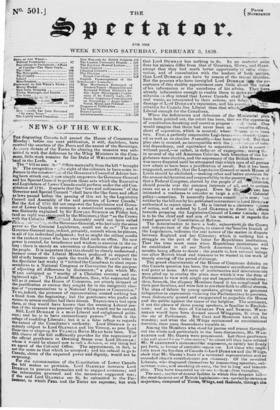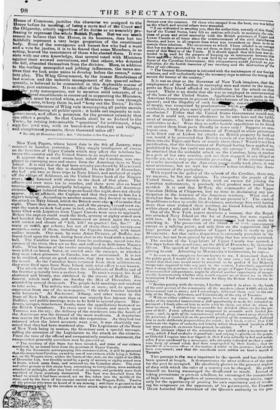NEWS OF THE WEEK.
„
THE disgusting Canadu bill passed the House of Commons on Monday : before our next publication, it will, doubtless, have received the sanction of the Peers and the assent of the Sovereign. At every dictate of the Tories for altering the measure was sub- muted to with due deference by the Whig Ministers in the Com- mons, little work remains for the Duke of WzmaNnTori and his
band in the Lords. •
The "bill as erne: .1e., " ,liffers materially from the hill "brought in." The recognition o ,Are right of the colonists to have some in- fluence in the construct n of the Governor's Council of Advice hay- ing been struck out, it now simply empowers the Governor-General and his Special Council to perform those acts which the Executive and Legislature of Lower Canada could perform under the old Con- stitution of 1791. It enacts that the "laws and ordinances" of the Governor and Special Council "shall have the like force and effect is laws passed before the passing of this act by the Legislative Council and Assembly of the said province of Lower Canada." But the Act of 1791 did not empower the Legislature and Gover- nor of Lower Canada to summon a constituent assembly ; and it was distinctly explained by Sir EDWARD SUGDEN on Friday last, (and no reply was altos pted by the Ministers,) that "as the Crown with the Coloeini ...-.1-"und Assembly could not have called s •r so the Governor-General, who bad only theism. power as the Colonial Legislature, could not do so." The new Governor-General may, indeed, privately, consult whom he pleases, in aid of his individual judgment ; but so might the silliest noodle or the rankest tyrant who has ever filled such an office. No new power is created, for beneficence and wisdom to exercise in the co. lony : there is merely an uncreation or dissolution of the power of the people. It is important that this should be clearly understood ; because some of the Liberal Members professed to support the bill chiefly because (to quote the words of Mr. WARD'S letter in the Spectator last week) it "invited the Canadians to elect repre- sentatives to a National Congress or Convention for the purpose of adjusting all differences by discussion ; " a plan which Mr. WARD eulogized as "worthy of a Christian country and en- lightened age." The Liberal Members, then, who supported the bill as it passed the House of Commons, are utterly stripped of the justification or excuse they sought for in the imaginary elec- tion of "representatives to a National Congress or Convention." To us, indeed, the pretence of representation seemed nothing but a fraud from the beginning ; but the gentlemen who prefer soft Visions to severe realities had their dream. Experience is lost upon them, or they would have known that the seeming Liberal por- tion of the measure was precisely that which would not be carried. Still, Lord DURHAM is a most Liberal and enlightened politi- cian; and he is to have extraordinary powers." Such is the .refuge of confiding Liberals ; but it is a false refuge as regards the extent of the Conciliator's authority. Lord DURHAM is as entirely subject to Lord GLENELG and his Viceroy, as poor Lord GOSEORD or claptrap Sir FitaNcts BOND HEAD have been. The fifth clause of the bill sufficiently provides for the supremacy of the official gentlemen in Downing Street over Lord DURHAM; whom it would be absurd now to call a aiCtilt01, or any thing but an agent of the Colonial Office. The appointment, in fact, is not the same as that which he accepted ; and his refusal to go to Canada, shorn of the expected power and dignity, would not be surprising. For the reconstruction of the Constitution of Lower Canada the bill makes no provision. Lord GLENELG instructs Lord DURHAM to procure information and to suggest measures; and the information procured and the measures suggested may, if the said Lord GLENELG see fit, be submitted to the Par- lament, in which Pim and the Tories are supreme; but with that Lord DURHAM has nothing to do. In no material point does his mission differ from that of GOSFORD, GIPes, and GREY. except that they had much better opportunity of calm obset- vation, and of consultation with the leaders of both parties, than Lord DURHAM can have by reason of the recent troubles. But the persons who have inveigled Lord DURHAM *fp the ac- ceptance of this shabby appointment care little about the value of his information or the soundness of his advice. They ave already information enough to enable them to make sue1 stitution as they intend that Lower Canada shall ha
real wants, as interpreted by their actions, are delay;
damage of Lord DURHAM'S reputation, and his eanetiu9 .14"1„,nt"
On.
stitution for Canada less Liberal than that whit: Liberal enough enough for the Canadians.
When the deficiencies and delusions of the Ministerial plan have been pointed out, the retort has been, that we the opponents of constitution-breaking and coercion propose .s1; • itute. One
would imagine that there had never been an 'emotive offered,
short of separation, which is scouted; when, 'here 11` v° been , two. First, a perfectly responsible Legis1ature-1o,, eloctite Conn- cil as well as an elective Assembly—has been nroi, ,s•-d. But that plan also is scouted, as incompatible with the Is s:e••■ al ion iif colo- nial dependency, and equivalent to separation. A his is assert- • without proof,—or rather, in defiarce of' experience; seeing tb,I in several of the old American Colonies both branches of the Le- gislature were elective, and the supremacy of the British Soverer was never disputed until he attempted that which men of all parties I now admit to have been a justification of revolt. But it has been. / suggested, secondly, that the Legislative Council or mock House of Lords should be abolished,—making other and better provision for • the ut most deliberation and responsibility in the passintrai,pills; aio that a Federal Congress, elected by the people of all Colonies, should preside over the common interests a ail, and in certain cases act as a tribunal of appeal. Even Sir Roki.a'sal. has intimated a readiness to consider so large a sell. of Colonial policy—sometime. It assuredly deserves consid- to ni now; )ut neither by the bill nor by his published instructione.ie Lord DUR:I authorized to report upon it. He is limited to a narrower ,,here of action, and is ordered by Lord Gnatvato to direct his efforts 1 towards propping the LegislativeCouncil of Lower Canada: this ' is to be the chief end and aim of- his mission, as it regards the vexed question of Constitutiooal Reform. The determination to have a body, subserlient,io the Crown and independent of the People, to control the elective branch of the Legislature, indicates the real nature of' the matter in dispute between England and her Colonies; which is nothing but a , struggle on the part of the latter for Republican institutions. I That the time must come when Republican institutions will be established in all our North American Cidanies, no rea- sonable being affects to doubt : the puzzle is, how rational beings can allow British blood and treasure to be wasted in the work of merely staving off the period of change.
The grand characteristic of the House of Commons debates on this Canada question has been, the systematic mystification of the real point at issue. All sorts of irrelevancies and misstatements
were piled up to overlay the plain case which it was the duty of Parliament to view with single eye and imperturbable steadiness: then, forsooth, the slippery Members found it too complicated for their poor faculties, and were fain to pin their faith to official sleeves. The slips of debate by young speakers, giving vent to generous indignation in expressions violating the Parliamentary hypocrisies, were dishonestly quoted and exaggerated to prejudice the House and the public against the cause of the helpless. The sentiment,
if not the phrase of those young speakers, is familiar to Enelish-
men; and in the days of CHARLES Fox and SAMUEL Wait- BREAD would have been deemed sound Whiggistn, fit even for the ear of Parliament. But Cant and Mammon have all the worship; and what the old Whigs maintained as constitutional doctrine, their puny descendants tremble at.
Among the Members who stood for justice and reason through- out the whole and particularly in the later discussions, Mr. WAR- , BURTON and Mr. GROTE were preemieent. Let those gentlemen : who call aloud for un " ulternatite:' be silent till they have refuted Mr. W ARBURTON'S statesmanlike argument, so calmly but firmly put forth, ill favour of amicable sepsra ion. Let those who impli- citly trust he fieedorn of Canada to Lord DURHAM and the Whigs. show that Mr. GROTE'S fears of a restricted representation and an extended church establishment are visionary. Of the so-called Liberals, who disgraced themselves by timeserving speeches, sub- servient voles, and sneaking oh-once, the list is long and lament- able. They have treasured sh line to thttm,Aves hereafter. The easy, matter-of-course fashion in which this despotic bill— the most despotic act of British legislation—we, carried by immense majorities, composed of Tories, Whip, and Radicals, through the
House of Com:lone, justifies the eharacter we assigned to the House before its meaning, of being a mere tool of the Court ted , the Oligarchy, utterly regardless of its duties as an assembly pro- fessing to represent the *hole Denial People. But 'we see tobeh reason to believe that the House, in its baseness, does but too faithfully represent a very large proportion of the constituent body. Even of the courageous and honest few who had a word and a rote for justice, it is to be feared that some Members, in so acting, braved the resentment of those who eleeted-ehem. It con- sists with our own knowledge, that several voted with Ministers against their avowed convictions, and that others, who detested the bill, absented themselves from the division. Here, in addition to the trading monopolist and jobbing influences, the mean mo- tives that we took some pains to develop before the recess,* come into play. The Whig Government, by the insane Resolutions of last session and the imbecile management of the quarrel subse- quently, is believed to be committed in this deplorable course of action, past extrication. It is an affair of the "Reform" Ministry ; he petty consequence, not to mention solid interests, of' so eral constituents is concerned in supporting the Ministers, must be called white, and Members must vote through mire, to keep them in, and "keep out the Tories." In this ntinuance of Whig rule is corrupting all public morals using all public spirit : it holds out impunity to rills- vernment, and offers a premium for the greatest calamity that can afflict a people. So that Canada shall be as Ireland to the , Tories, by raising interminable " questions" for settlement, what I sign fibs civil war, with its burnt-down churches and villages, ; and slaughteren peasants, three thousand miles off?
• No. 492, ad December 1837; Art. " Obstacles to the Projess of Reform."



























 Previous page
Previous page